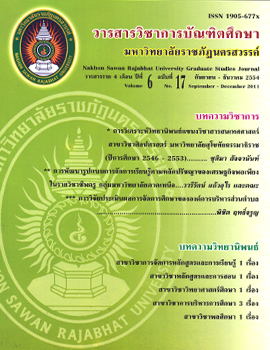การพัฒนารูปแบบการจัดการเรียนรู้ตามหลักปรัชญาของเศรษฐกิจพอเพียงในรายวิชาชีพครู กลุ่มมหาวิทยาลัยภาคเหนือ
Main Article Content
Abstract
บทคัดย่อ
การวิจัยครั้งนี้มีวัตถุประสงค์เพื่อ 1) สร้างและตรวจสอบคุณภาพรูปแบบการจัดการเรียนรู้ตามหลักปรัชญาของเศรษฐกิจพอเพียงในวิชาชีพครูกลุ่มมหาวิทยาลัยภาคเหนือ 2) ทดลองใช้รูปแบบการจัดการเรียนรู้ตามหลักปรัชญาของเศรษฐกิจพอเพียงในวิชาชีพครูกลุ่มมหาวิทยาลัยภาคเหนือ และศึกษาผลการใช้รูปแบบการจัดการเรียนรู้ตามหลักปรัชญาของเศรษฐกิจพอเพียงในกลุ่มรายวิชาชีพครู ในด้านผลการเรียนรู้บนฐานหลักปรัชญาของเศรษฐกิจพอเพียง ดำเนินการวิจัยโดยใช้ระเบียบวิธีวิจัยเชิงพัฒนา โดยมีขั้นตอนการดำเนินการวิจัยเป็น 2 ขั้นตอน ดังนี้ ขั้นตอนที่ 1 การสร้างและตรวจสอบคุณภาพรูปแบบการจัดการเรียนรู้ตามหลักปรัชญาของเศรษฐกิจพอเพียงในรายวิชาชีพครูกลุ่มมหาวิทยาลัยภาคเหนือ ขั้นตอนที่ 2 การทดลองใช้รูปแบบการจัดการเรียนรู้ตามหลักปรัชญาของเศรษฐกิจพอเพียงในรายวิชาชีพครูกลุ่มมหาวิทยาลัยภาคเหนือ แบบพหุกรณี
ข้อค้นพบที่สำคัญจากการวิจัยสรุปได้ดังนี้
1. รูปแบบการจัดการเรียนรู้ตามหลักปรัชญาของเศรษฐกิจพอเพียงในวิชาชีพครู มีองค์ประกอบของรูปแบบที่พัฒนาขึ้นคือ ความเป็นมาและความสำคัญของรูปแบบฯ แนวคิด/ทฤษฎีที่ใช้เป็นฐานในการพัฒนาหลักการของรูปแบบฯ มุ่งเน้นพัฒนานิสิตให้ประยุกต์ใช้เศรษฐกิจพอเพียงเพื่อพัฒนาตนเองในพฤติกรรมด้านต่างๆ ทั้งด้านเศรษฐกิจ ด้านจิตใจ/คุณธรรมจริยธรรม ด้านการเรียน ด้านสุขภาพกาย ด้านสังคม ด้านบุคลิกภาพ/นิสัยส่วนตัว ด้านทรัพยากรธรรมชาติและสิ่งแวดล้อม ด้านเทคโนโลยี ด้วยหลักแห่งความพอประมาณ ความมีเหตุมีผล และมีภูมิคุ้มกัน บนฐานของการใช้ความรู้คู่คุณธรรม วัตถุประสงค์ของรูปแบบฯ เนื้อหา/สาระการเรียนรู้ กระบวนการจัดการเรียนรู้ตามรูปแบบฯ : ขั้นตอนการจัดกิจกรรมการเรียนรู้ ระบบสังคม หลักปฏิสัมพันธ์ ระบบสนับสนุน ผลที่เกิดกับผู้เรียน และ การนำรูปแบบฯไปใช้ รูปแบบมีหลักการสำคัญ 5 ประการ คือ 1) การจัดการเรียนการสอนจะต้องเน้นให้เกิดการเรียนรู้โดยเป็นกระบวนการที่เกิดจากผู้เรียนสร้างความรู้ด้วยตนเองในสภาพแวดล้อมของการมีตัวแบบที่ดีการมีสภาพแวดล้อมที่เอื้อต่อการเรียนรู้ 2) กระบวนการเรียนรู้เน้นให้เกิดการสะท้อนสิ่งที่คิด สิ่งที่แก้ปัญหา และสิ่งที่จะนำปฏิบัติด้วยการใช้หลักปรัชญาของเศรษฐกิจพอเพียงเน้นการคิดใคร่ครวญถึงผลกระทบที่เกิดจากการคิดและการกระทำ 3) ผู้เรียนได้พัฒนาทักษะที่ส่งเสริมความสามารถในการเรียนรู้ 4) จัดการเรียนการสอนอย่างเป็นระบบ 5) การจัดกระบวนการเรียนรู้ยึดผู้เรียนเป็นสำคัญ เน้นความหลากหลายในการนำไปปฏิบัติ มีวัตถุประสงค์ของการจัดการเรียนรู้ตามรูปแบบเพื่อพัฒนาผู้เรียนให้มีคุณลักษณะ 3 ประการ คือ 1) ดีโดยเป็นผู้ที่มีจิตวิญญาณความเป็นครู ใช้หลักปรัชญาของเศรษฐกิจพอเพียงกำกับการคิดและการกระทำ 2) เก่งโดยเป็นผู้มีปัญญา ความรอบรู้ในศาสตร์ด้านการจัดการเรียนรู้มีผลสัมฤทธิ์ทางการเรียน มีทักษะที่ส่งเสริมความสามารถในการเรียนรู้ ได้แก่ ทักษะการวิเคราะห์ การสังเคราะห์ การประเมินค่า การแก้ปัญหาและการนำความรู้ไปประยุกต์ใช้ในการประกอบวิชาชีพครู 3) มีความสุขโดยเป็นผู้มีกระบวนการเรียนรู้และมีการเรียนรู้อย่างต่อเนื่องตลอดชีวิต โดยมีกระบวนการสืบเสาะหาความรู้และความใฝ่รู้ รูปแบบการจัดการเรียนรู้ตามหลักปรัชญาของเศรษฐกิจพอเพียงในวิชาชีพครู มีขั้นตอนการจัดการเรียนรู้ในรูปแบบการเรียนการสอนตามทฤษฎีกลุ่มพุทธิปัญญานิยมตามแนวทฤษฎีการสร้างความรู้และทฤษฎีการเรียนรู้ทางสังคมเชิงพุทธิปัญญา เป็น 5 ขั้นตอนที่เรียกว่า “PLRCA Model” ดังนี้ 1) ขั้นเตรียมความพร้อมสำหรับการเรียนรู้ (Preparing: P) 2) ขั้นเรียนรู้สิ่งใหม่โดยเชื่อมโยงกับความรู้เดิมและความเข้าใจที่มีอยู่ในปัจจุบัน แล้วฝึกปฏิบัติ (Learning: L) 3) ขั้นสะท้อนความคิดเชื่อมโยงกับหลักปรัชญาของเศรษฐกิจพอเพียง (Reflecting: R) 4) ขั้นสร้างความรู้และประยุกต์ใช้ (Constructing: C) 5) ขั้นประเมินผล (Assessing: A) ผลการตรวจสอบคุณภาพของรูปแบบการจัดการเรียนรู้ด้วยการระดมสมองจากนักการศึกษาด้านครุศาสตร์/ศึกษาศาสตร์ 5 คน ที่มีส่วนได้ส่วนเสียใน 3 มหาวิทยาลัย ของกลุ่มมหาวิทยาลัยภาคเหนือ พบว่า รูปแบบการจัดการเรียนรู้ตามหลักปรัชญาของเศรษฐกิจพอเพียงในวิชาชีพครู มีความเหมาะสมและความเป็นไปได้ในการนำไปจัดการเรียนรู้ในวิชาชีพครูทั้ง 3 มหาวิทยาลัยมีความเห็นร่วมกันในการนำรูปแบบการจัดการเรียนรู้ที่พัฒนาขึ้นไปใช้2. ผลการทดลองใช้รูปแบบการจัดการเรียนรู้ตามหลักปรัชญาของเศรษฐกิจพอเพียงในวิชาชีพครูกลุ่มมหาวิทยาลัยภาคเหนือแบบพหุกรณี ของ 3 สถาบัน คือ มหาวิทยาลัยนเรศวร 4 กรณีตัวอย่าง มหาวิทยาลัยราชภัฏอุตรดิตถ์ 2 กรณีตัวอย่าง มหาวิทยาลัยเชียงใหม่ 1 กรณีตัวอย่าง พบว่า ทุกกรณีของการใช้รูปแบบการจัดการเรียนรู้ตามหลักปรัชญาของเศรษฐกิจพอเพียงในวิชาชีพครูช่วยพัฒนาให้นิสิตนักศึกษามีผลการเรียนรู้บนฐานหลักปรัชญาของเศรษฐกิจพอเพียงหลังเรียนสูงขึ้น
Abstract
This research project is based on two prime objectives, which are 1) to construct and check a learning management model based on the sufficiency economy philosophy in teacher profession, university of the north quality inspection 2) to try out the learning management model based on the sufficiency economy philosophy in teacher profession, university of the north and study results of learning management model based on the sufficiency economy philosophy in teacher profession subjects in the learning outcomes based on the sufficiency economy philosophy. Research methods consisted of two steps. Firstly, the learning management model based on the sufficiency economy philosophy in teacher profession was developed from the review related document and the field study by using focus group and summarize with content analysis techniques. Secondly, the developed learning management model based on the sufficiency economy philosophy was validated implementation by using the multi case studies in 3 higher education in teacher profession subjects, university of the north.
The research result found that
1. the developed learning management model based on the sufficiency economy philosophy has importantly assumption of educational management in the line of royal guidance focused on giving education with help individual search for correctly and appropriately life way lead to conventionally progress and happiness and leaning management in the line of the King Bhumibol’s Sufficiency Economy Philosophy Constructivist Theory, Social Cognitive Learning Theory, and Information Processing Theory, and use the B.Joyce, M.Weil, and E.Calhoun’ models of teaching concept. The components of the developed learning management model have 1. Orientation to the Model; Theories / Concepts, Principles, Goals and focusing on the principle of encouraging students to apply the sufficiency economy philosophy for self development in any behaviors all in economic, mind/ethics, learning, physical health, social, personality/personal habits, natural resources and environment, and technology facet with a major of modesty, reasonable, and immunity on the base of knowledge and morality. 2. The Model of teaching; Syntax, Social System, Principles of reaction, Support system, Application, and Instructional and Nurturant Effects. The principle of model has importantly 5 respects such as 1) the instruction and learning is required highlighted achieve learning to be process that learner
manually construct knowledge in a good fit model environment and accommodate to learn 2) learning process emphasize students reflect thinking, solve problems, and implementation with the sufficiency economy philosophy by using critical reflection to impact from thinking and acting 3) learner be develop skills that encourage learning ability 4) managing systematic instruction 5) arranging learning process focused on child centered and the diversity in practices. The model objective has 3 attributes; 1) good it is being spirit a teacher and use the sufficiency economy philosophy control thinking and acting 2) smart it is intelligence and mastery in the science of learning management, has skill to encourage learning ability such as analytical skill, synthesis, evaluation, problem solving, and bring knowledge to application in teacher profession 3) happy it is the person who has learning process and learn continuously throughout life, quest to be a learning process and want to know. A learning management model based on the sufficiency economy philosophy in teacher profession subjects has 5 the process of learning or “PLRCA Model” as follow 1) Preparing: P 2) Learning: L 3) Reflecting: R 4) Constructing: C 5) Assessing: A. The result of verifying model quality with Connoisseurship by 5 educators from 3 higher education institutes stakeholder showed that the developed learning management model has good quality and can be used appropriately with a learning management model based on the sufficiency economy philosophy in teacher profession, university of the north.
2. the result of multi case studies’ implement and study the result of model in teacher profession subjects, university of the north in faculty of education 3 institutes; Naresuan university in 4 cases, Chieng Mai university in 1 case and Uttaradit Rajabhat university in 2 cases. The results of learning management model based on the sufficiency economy philosophy in teacher profession subjects implementation met with all of the 7 cases improve teacher students have learning outcomes based on the sufficiency economy philosophy after learned with the developed learning management model higher than before.


